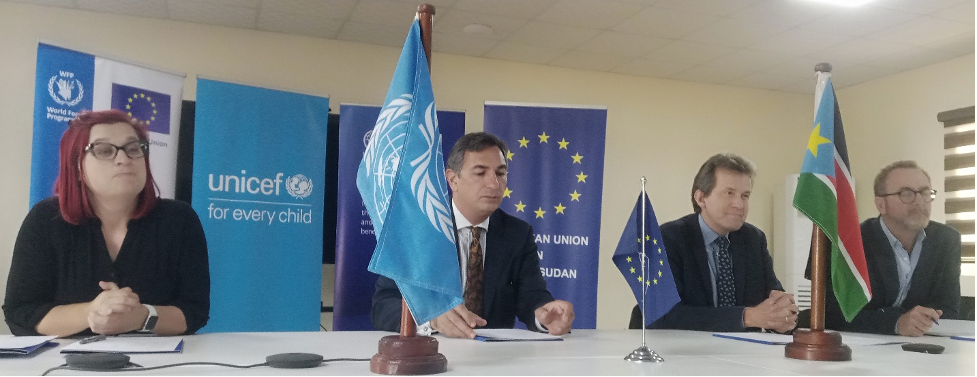
EU provides 25 million Euros to strengthen education, resilience

The European Union delegation in South Sudan has contributed 25 million Euros to help strengthen access to education and livelihoods.
The program will be implemented by the United Nations International Organization for Migration (IOM), UNICEF and World Food Program (WFP), according to Gabriel Octavian Leonte, the head of cooperation for the EU delegation in South Sudan.
“South Sudanese are strong and resilient people who have gone through repeated cycles of deprivation, hardship, and violence. With this additional program, the EU delegation affirms its commitment to enhance the resilience of vulnerable population in South Sudan,” said Leonte during the ceremony in Juba.
The program targeting 120,000 beneficiaries will run for three years.
“This new program with a strong focus on education, builds resilience from the ground up through a multi-sectoral and area-based approach. It targets girls, boys, women and men, families, communities and the wider system,” said Leonte.
He disclosed that it offers a wide range of services and activities that will help build more resilience.
Peter Van der Auweraert, IOM South Sudan chief of Mission, said the project will provide South Sudanese with solid basis for independence and resilience.
“The project is taking an integrated multi-sectoral support focusing on displaced populations and host communities, it provides them with solid basis for independence and resilience, we need to move form humanitarian assistance to development in all parts of the country where this is possible,” said Auweraert.
Jesper Moller, the Deputy Country Representative for UNICEF, said education is critical component for transforming the lives of children.
“Education is critical component in transforming the lives of children and building resilience in communities. This program will provide the much-needed attention to education in the effort to alleviate the multiple challenges displaced persons faced at the time of reintegration,” said Moller.
Adeyinka Badejo, the Acting Country Director for WFP, said the project will benefit returnees and host communities, adding it also provides integrated package of education, child protection and nutrition interventions.
“Families affected by conflict and extreme weather have lost their livelihoods and have no means to support themselves or to feed their children, this project will provide children from both returnee and host communities with daily nutritious school meals which relieves parents from having to budget for lunches and encourages greater enrollment and retention of children in schools,” said Badejo.
Over 2 million children are believed to have dropped out of school due to conflict, flooding and early or forceful marriages in South Sudan.




































